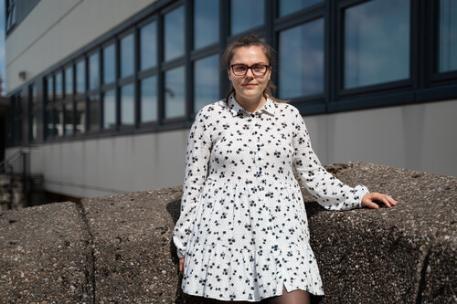Dr Hannah Spencer
Post Doctoral Research Assistant
Dr Hannah Spencer started studying Clinical Sciences at The University of Bradford in 2012. Following the completion of her undergraduate degree, she undertook an MSc in Biomedical Sciences, which she completed in 2017.
Hannah recently gained her PhD in “Design, synthesis and preclinical evaluation of MT1-MMP targeted methotrexate prodrugs for the treatment of osteosarcoma” (2018-2022) under the supervision of Professor Robert Falconer, Professor Paul Loadman, and Dr Steven Shnyder, which was funded by Bone Cancer Research Trust (BCRT).
Hannah is due to graduate in the 2023 summer graduations.

Dr Hannah Spencer
I first found a love for research during my Masters research project where my supervisor opened my eyes to the possibilities of research.
My research journey
After gaining a BSc in Clinical Sciences from the University of Bradford, I continued my studies with a Masters in Biomedical Sciences, with a project focusing on the biomedical applications of temperature-sensitive polymers, graduating with Distinction. Following this, I took a Research Assistant position working with Dr Rianne Lord which focused on the synthesis of Oxovanadium(IV) Complexes with anticancer implications.
I recently gained my PhD in “Design, synthesis and preclinical evaluation of MT1-MMP targeted methotrexate prodrugs for the treatment of osteosarcoma” which was funded by Bone Cancer Research Trust (BCRT).
Methotrexate is a type of chemotherapy routinely used to treat osteosarcoma patients, my research looked at ways to reduce its side effects using a prodrug approach that could destroy cancer cells without negatively affecting other parts of the body. It’s a really important and rewarding area of study.
Looking to the future
For the next 3 years as part of my role as a Post Doctoral Research Assistant, I will work on further developing the methotrexate prodrugs for the treatment of osteosarcoma project to identify the lead compounds for preclinical evaluation.
Looking to the future, there are so many opportunities open to me after completing my Post Doctoral Research Assistant. I like to think that I will somehow be teaching the next generation of scientists, whether that be in academia or even possibly in industry.
Developing better cancer treatments is something I’m hugely passionate about, and I hope my research will play a fundamental part in achieving this.
My main inspiration is the cancer survivors who I have had the opportunity to meet through BCRT, the charity that funds my research project. Hearing their stories and understanding the potential impact that the work I do could have on those affected by cancer, makes me strive to do my best every day.
